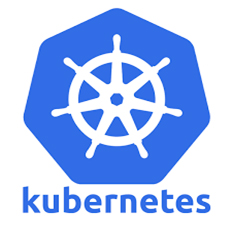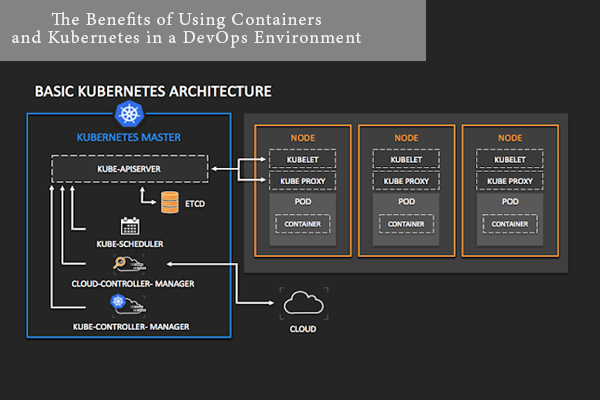The Benefits of Using Containers and Kubernetes in a DevOps Environment
In today’s fast-paced software development world, the adoption of containers and Kubernetes is rapidly transforming how applications are built, deployed, and managed. These technologies are central to DevOps practices, providing numerous benefits that streamline workflows, improve scalability, and enhance overall efficiency. Let’s dive into why containers and Kubernetes have become essential in a modern DevOps environment and explore the key advantages they offer.

- Consistency Across Environments
Containers provide a standardized environment for applications, ensuring that the application runs the same way in development, testing, and production environments. This consistency eliminates the “it works on my machine” problem, where software behaves differently in different environments due to mismatched dependencies or configurations.
- How Kubernetes Helps: Kubernetes automates the deployment and scaling of containers across multiple environments (development, staging, production). By abstracting away the underlying infrastructure, it ensures that the application runs consistently across various platforms, whether on-premise or in the cloud.
Benefit: Developers can be confident that their code will perform the same way in production as it does during development and testing.
- Improved Scalability
Scalability is a critical requirement in modern applications that need to handle varying loads efficiently. Containers allow you to package applications and their dependencies into isolated, lightweight environments that can be easily replicated.
- How Kubernetes Helps: Kubernetes provides powerful auto-scaling capabilities, enabling applications to scale up or down based on traffic demand. Kubernetes can monitor resource utilization (like CPU and memory) and automatically adjust the number of container instances running to match the current demand.
Benefit: Kubernetes helps teams manage resources effectively, ensuring that applications can scale seamlessly to accommodate spikes in traffic without manual intervention.

- Faster Development and Deployment
Containers are lightweight and fast, allowing developers to rapidly build, test, and deploy applications. Because containers encapsulate everything the application needs to run (from code to libraries), they can be quickly packaged and shipped to any environment, facilitating continuous integration and continuous delivery (CI/CD) pipelines.
- How Kubernetes Helps: Kubernetes automates and orchestrates the deployment of containers, managing everything from the networking between containers to ensuring they are running on the right servers. It enables continuous delivery by allowing developers to deploy code changes in isolated containers without affecting the rest of the system.
Benefit: With containers and Kubernetes, development teams can significantly reduce the time it takes to deploy new features, updates, or patches, enhancing the speed of the entire development cycle.
- Enhanced Fault Tolerance and Reliability
One of the most significant benefits of using Kubernetes with containers is the increased fault tolerance and high availability. Kubernetes offers advanced mechanisms for monitoring container health, replacing failed containers, and automatically restarting services if something goes wrong.
- How Kubernetes Helps: Kubernetes constantly monitors the health of containers and restarts or replaces failed containers without downtime. Additionally, it distributes containers across multiple nodes, ensuring that services remain highly available even if one node fails.
Benefit: Kubernetes ensures that applications remain up and running even when individual components or containers fail, minimizing downtime and improving the reliability of applications.
- Resource Efficiency
Containers are lightweight and share the host operating system’s kernel, which makes them more resource-efficient compared to traditional virtual machines. This leads to better utilization of system resources and improved performance.
- How Kubernetes Helps: Kubernetes optimizes resource utilization by managing the allocation of CPU and memory resources to containers. It automatically adjusts resources to meet the needs of each containerized application, ensuring efficient use of available hardware.
Benefit: Organizations can achieve better resource efficiency, reduce infrastructure costs, and optimize performance by running more containers on the same hardware compared to traditional VMs.
- Simplified Infrastructure Management
Containers and Kubernetes abstract away many of the complexities involved in infrastructure management, such as networking, storage, and load balancing. This simplifies operations and allows developers to focus more on code than managing infrastructure.
- How Kubernetes Helps: Kubernetes automates complex tasks such as load balancing, service discovery, and networking, so developers don’t have to manually configure these components. Kubernetes also provides a self-healing system that ensures the application is always available and operating as expected.
Benefit: Teams can reduce operational overhead and infrastructure complexity, allowing developers and operations teams to collaborate more effectively on higher-level tasks.
- Easier Rollbacks and Versioning
When deploying new versions of applications, rolling back to a previous version can be difficult and error-prone in traditional environments. Containers and Kubernetes make version control and rollbacks easier and safer.
- How Kubernetes Helps: Kubernetes supports versioned deployments, which makes it easy to roll back to a previous version of an application if there are issues. Kubernetes also allows blue/green and canary deployments, where new versions are deployed gradually, reducing the risk of issues in production.
Benefit: Teams can deploy new versions of applications with confidence, knowing that they can easily roll back if something goes wrong, and without causing downtime.
- Improved Collaboration Between Dev and Ops Teams
In a DevOps culture, containers and Kubernetes help foster better collaboration between development and operations teams by standardizing the deployment process and simplifying infrastructure management.
- How Kubernetes Helps: Kubernetes provides developers with a consistent platform for deploying containers and offers operations teams a way to manage resources efficiently. This alignment ensures that both teams are working on the same technology stack, reducing friction and improving communication.
Benefit: DevOps teams can work more cohesively and deliver software faster and more reliably, creating a more collaborative environment that supports rapid innovation.
- Cloud-Native Applications and Multi-Cloud Flexibility
The adoption of containers and Kubernetes is fundamental to the cloud-native approach, where applications are designed to run across multiple cloud environments. Kubernetes makes it easier to deploy applications on any cloud (public, private, or hybrid), giving organizations more flexibility and preventing vendor lock-in.
Benefit: Organizations can run containerized applications seamlessly across multiple cloud providers, giving them greater flexibility in choosing and switching between clouds based on their needs and cost considerations.







